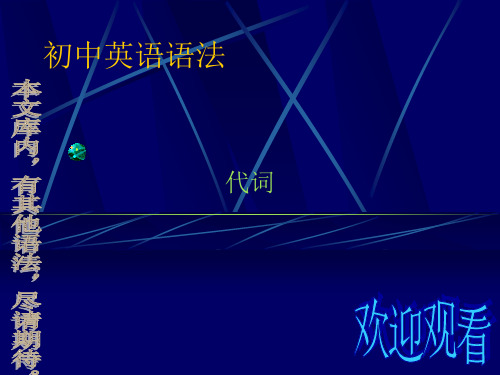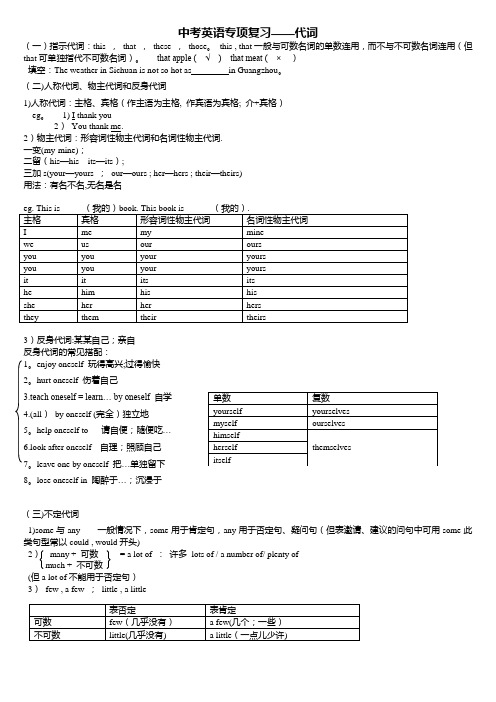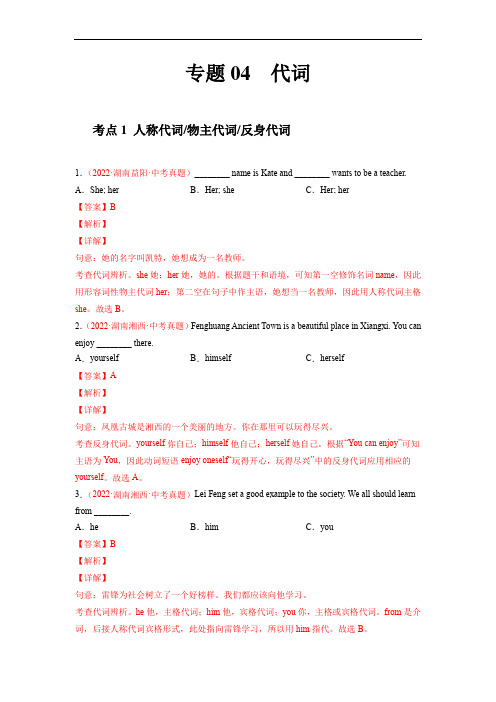中考考点代词
- 格式:docx
- 大小:67.56 KB
- 文档页数:8



中考冲刺经典专题系列第二讲中考必考点----代词必考点之易错易混部分:考点一:人称代词:主格;宾格。
考点二:物主代词:形容词性物主代词和名词性物主代词。
考点三:反身代词:掌握短语:enjoy oneself, learn---- by / teach oneself, help oneself to sth, makeoneself at home, dress oneself考点四:指示代词:this,that,these,those。
This,that特别用于打电话指自己和对方。
考点五:疑问代词:what,which,who,whom考点六:不定代词:A:some & any。
B:few / a few & little / a littleC:each & every:each (常与of连用) 做主谓用单,强调个体;every(形容词)+单数名词作主谓语用单,强调整体D:both,either,neither,all,noneE:other,others,the other,the others,anotherF:复合不定代词:something,anything,everything,nothing等等。
考点七:it,that,one的区别。
1. — Who broke the window? — Not _____.A. IB. heC. her2. Miss Li invited __ have dinner with her .A. me and youB. you and IC. you and me3.We ____ at the party last Sunday.A. enjoyed myselfB. enjoyed ourselvesC. enjoy myselfD. enjoyed themselves4. Only____know it.A. I and heB. he and youC. he and ID. I and you5. "Make____at home." he said to his friends.A. yourselfB. yourselvesC. youD. yours6. The population of Shanghai is larger than __ of Jinan.A. thatB. thisC. it7. The radios made in Beijing are as good as ___ made in Qingdao.A. thatB. theseC. those8. ----____ is your classmate John like? ---He's very tall.A. HowB. WhatC. Who D . Which9. Do you have _____ to do this evening?A. important somethingB. anything importantC. something important10. Would you like __? I can get it for you .A. something elseB. anything elseC. everything else11. Although all the girls have tried their best , only ___ pass the exam.A. fewB. a fewC. a little12. Don’t worry .There is ____ time left .A. littleB. a littleC. few13. You are so great! ____ people in the school can do it .A. A littleB. LittleC. Few14. Each of them __ an apple.A. haveB. hasC. having15.There is a line of trees on ___ side of the street.A everyB eachC both16. How many people are there in the room? — ___.A. NoneB. No oneC. Lucy17. Who is in the room? — ___.A. NoneB. No oneC. one18. ___ of the girls ___ him. They asked him for name card.A. Neither; knowB. Either; knowC. Neither; knows19. Both of his parents ___ teachers.A. isB. areC. was20. How are your parents ? They are ____ fine.A. bothB. allC. no21. There are 40 students in our class, 22 are boys ,__ are girls.A. the othersB. othersC. the other22. One of the sides of the road should be painted yellow, and___ white.A. the other B.another C. others23. This pair of trousers is too short. Would you please show me ___ one.A. otherB. othersC. another24. I have two brothers. __ is a doctor, __ is a soldier.A. One, the otherB. One, otherC.The one, the otherD. One; the others25. Some people like to stay at home on Sundays, but ____ like to go to the cinema.A.otherB. anotherC. the othersD. others26. I have five color pencils, one is red, another is blue and ______ are green.A.the othersB. otherC. the otherD. others27. I found ____ important to read English in the morning.A. itB. thatC. whichD. its28. I have some apples here. You can have____.A. oneB. itC. thatD. those29. The population of China is much larger than ____ of Canada.A. itB. thatC. oneD. this30. Which would you like, a cup of tea or a glass of milk? -____, thanks. I think I'll just have a glass of water.A. NoneB. NeitherC. BothD. Either31. There are many trees on ____side of the street.A. eitherB. bothC. allD. every一完形填空【2011浙江湖州】Alicia was a young woman who liked to exercise for her health. In fact, she walked five kilometers before 26 every morning, and went swimming once a week at the swimming pool. She didn’t smoke and never 27 . She didn’t eat chocolate. She didn’t e at sweet and fatty food, 28 . She weighted herself every day.One day Alicia was on her daily walk when she saw a 29 sitting in a rocking chair under a tree. He looked very old and his hair was white. He looked thin and weak, and his hands were shaking, 30 he looked very happy.He smiled at her and said, “Good morning! Lovely day, isn’t it?”He had a wide smile 31 his face, and his eyes shone with happiness. But Alicia saw that he did not have teeth.“Good morning!” replied Alicia. “Yes, it is a lovely day.”Alicia thought he 32 very old and wise. She thought he must be at least 90 years old! She decided to ask him about the 33 of a happy old age.“I hope you don’t 34 me asking,” she said, “but what is your secret for bei ng so happy at your age? I hope I can look as happy as you do 35 I am your age.”The man in the rocking chair said, “My secret for 36 ? I smoke twenty packets of cigarettes every week, and drink three bottles of wine every day. I eat hamburgers and chocolates whenever I want. I never eat vegetables. I never walk anywhere and I never play sports. I sit at home every day.”Alicia was 37 . She didn’t expect the man to give her an answer like that. She wondered how the man got to be so old when he did 38 wrong. She thought he should be 39 and unhappy. Perhaps she was wrong. Maybe, she thought, people could live a long happy life 40 eating well or doing lots of exercise.“How old are you?” she asked.“It’s my birthday today,” said the man. “I’m forty -seven!”26. A. lunch B. breakfast C. dinner D. supper27. A. exercised B . drank C. worked D. slept28. A. too B. also C. either D. still29. A. man B. woman C. boy D. girl30. A. so B. but C . and D. or31. A. in B. with C. at D. on32. A. saw B. looked C. listened D. found33. A. secret B. dream C. plan D. future34. A. stand B. mind C. allowD. enjoy35. A. when B. since C. though D. for36. A. health B. success C. happiness D. life37. A. surprised B. worried C. excited D. relaxed38. A. something B. anything C. everything D. nothing39. A. angry B. serious C. quiet D. sick40. A. through B. from C. without D. byBNasreddin was a poor man, so he tried to grow __1__ he could in his own garden, so that he would not have to buy so many in the market。

中考英语专项复习——代词(一)指示代词:this , that , these , those 。
this , that 一般与可数名词的单数连用,而不与不可数名词连用(但that 可单独指代不可数名词)。
that apple ( √ ) that meat ( × )填空:The weather in Sichuan is not so hot as __ in Guangzhou 。
(二)人称代词、物主代词和反身代词1)人称代词:主格、宾格(作主语为主格, 作宾语为宾格; 介+宾格)eg 。
1) I thank you2) You thank me.2)物主代词:形容词性物主代词和名词性物主代词.一变(my-mine);二留(his —his its —its );三加s(your —yours ; our —ours ; her —hers ; their —theirs)用法:有名不名,无名是名3)反身代词:某某自己;亲自反身代词的常见搭配:1。
enjoy oneself 玩得高兴;过得愉快2。
hurt oneself 伤着自己3.teach oneself = learn… by oneself 自学4.(all ) by oneself (完全)独立地5。
help oneself to 请自便;随便吃…6.look after oneself 自理;照顾自己7。
leave one by oneself 把…单独留下8。
lose oneself in 陶醉于…;沉浸于(三)不定代词1)some与any一般情况下,some 用于肯定句,any 用于否定句、疑问句(但表邀请、建议的问句中可用some-此类句型常以could , would 开头)2) many + 可数 = a lot of : 许多 lots of / a number of/ plenty ofmuch + 不可数(但a lot of 不能用于否定句)3) few , a few ; little , a little①。

中考初中英语代词完整归纳一、选择题1.You are supposed to bring _________ to his attention that the journey will be really tiring. A.that B.it C.this D.you2.Though I agree with most of what you said, that doesn't mean I agree with _________. A.anything B.nothing C.everything D.something 3.—Do you know whose books they are on the desk?—I don't know. They' re not ________. Ask Andrew, please.A.mine B.me C.my D.I4.Jeff dreams of becoming a detective like Sherlock Homes. He thinks there is ________ more exciting than solving a mystery.A.everything B.something C.anything D.nothing5.—This book on animals is interesting. I’d like ________. Where did you buy it, Simon?—In the bookshop near my school.A.it B.this C.that D.one 6.—Today’s Yangtze Evening, please.—There’s only one copy left. Would you like ________?A.they B.them C.it D.one7.Believe in yourself. Do this and no matter where you are, you will have ________ to fear. A.nothing B.something C.anything D.everything 8.Online short video apps like Douyin make ________ more convenient to learn about the world at home.A.it B.this C.one D.that9.—The apples are quite delicious! Can I have one more?—Sorry, there is ________ left, what about some oranges?A.none B.no one C.nothing D.nobody 10.We’d like to recommend Millie a s the Young Star because of ________ effort and kindness. A.our B.ours C.her D.hers11.It is wrong to copy others’ answers. Do homework by ________, boys!A.yourself B.yourselves C.myself D.ourselves 12.—Is this ________ bike?—No, it isn’t. I left my bike at home.A.my B.your C.his D.her13.They all think ________ to create such beautiful music with the transparent cups.A.it amazed B.that amazed C.it amazing D.that is amazing 14.My mother tried to cook ________ for me when I studied in New Zealand.A.different something B.different anything C.something different D.anything different 15.I can take good care of myself. I do not depend on ________.A.anybody B.everybody C.nothing D.something 16.Miss Liu is kind enough to help us whenever she is needed. We all like ______.A.she B.her C.him D.them17.—Are these cars made in Japan?—Yes, and they’re much cheaper than ___________ in American.A.that B.those C.it D.ones18.It’s very convenient ______ us to buy train tickets now because we can buy them either from the station or on the Internet.A.to B.of C.by D.for19.—Could you tell me how many classes you have on Friday afternoon?—___________. We can take part in activities in any club we like.A.None B.Nothing C.Neither D.Either20.—Did you go to the popular tourist attraction yesterday?—Yes. After waiting for hours to get in, I found ________ too tired to finish the tour.A.it B.me C.itself D.myself21.As the old saying goes, politeness costs nothing and gains ________.A.nothing B.anything C.everything D.something22.The key to success is to start where you are, not when things get better, not if things were different, nor if you had what ________ else has.A.something B.anything C.somebody D.anybody23.He thinks himself ________, but we think him ________.A.somebody, anybody B.somebody, nobody C.anybody, somebody D.anybody, nobody 24.— The TV series Love Designer is the most romantic drama I have ever seen.—I’m afraid it’s not ________ cup of tea.A.anybody’s B.everybody’s C.somebody’s D.nobody’s25.—All of us will visit Beijing Daxing International Airport next week.—Great! ________ of us has been there before and we want to know more about the local culture. A.None B.Either C.Both D.All26.—This book on Yancheng’s history is interesting. I’d like______. Where did you buy it, Tom? —In the Amazon Bookstore.A.it B.this C.that D.one27.My parents have made ________ a habit to go out for a walk around Xuanwu Lake.A.this B.it C.that D.one28.Dora always comes up with new ideas, but ________ is of any value to me.A.none B.nothing C.no one D.neither 29.—Have you prepared ________ for the picnic tomorrow?—-No, except the drinks.A.nothing B.anything C.everything D.something30.The teacher shared the photos of our school trip on her WeChat Moments. We can see them for ________.A.herself B.himself C.ourselves D.themselves 31.Think twice and make the decision. _______ else can do it for you.A.Somebody B.Nobody C.Everybody D.Anybody 32.—Though the film Hi, mom has achieved a great success, it isn’t liked by ________.—I think so. It is hard to please all.A.nobody B.somebody C.everybody D.anybody 33.—Excuse me, I want to buy a birthday gift for my brother.—Here are some gifts for boys. You can choose ________ for him.A.it B.one C.that D.them 34.—Tickets for Friday.—Sorry, we’ve got ________ left.A.none B.nothing C.no D.no one35.The weather in Beijing is cooler than ________ in Guangzhou.A.this B.that C.it D.one 36.—David, I have ________ to tell you.—Great! I’m excited to hear our country has made prog ress in exploring the space. A.something important B.anything important C.important something D.important anything37.If something is wrong, fix it. Do not worry. Worry never fixes ________.A.something B.anything C.nothing D.everything 38.Wu Xinhai, a stay-at-home dad in Beijing, said: “I want my kids to have a different childhood from ________.”A.my B.me C.myself D.mine 39.—Daniel, is this your mobile phone?—No. ________is on the table.A.I. B.me C.my D.mine40.The sheep are eating grass on the hill. How happy ________ look!A.it B.its C.they D.them【参考答案】一、选择题1.B解析:B【详解】句意:你应该让他注意到这次旅行会很累。

中考代词知识点梳理篇一:中考代词知识点代词知识点考点一、人称代词分为主格和宾格主格:在句子中充当主语,是动作的执行者。
宾格:在句子中充当宾语,是动作的承担者。
用法:动词、介词后面用人称代词的宾格(动介之后用人宾),在句中作表语时常用宾格He often beats me. / Look at her, her dress is very beautiful. / It’s me.★★it的用法:①作形式主语eg:It is very important to learn English well. 真正的主语是后面的to learn English well —To Learn English well is very important.②作形式宾语eg:I found it is important to learn English well. 真正的宾语是后面的to learn English well —I found to learn English well is important.③指代时间、天气、人等eg:It’s 9 o’clock. / It’s Monday today. / It was sunny yesterday. / It’s me.④用于强调句中eg:It is Li Ming who is a dictor.⑤用于前面提到的单数名词eg:I have a pen, it is black.★两个或两个人称代词连用时,要注意:单数时—2-3-1(你-他-我)自己始终放在最后面eg:You, he and I will go to Badong. / The teacher wants you, Jim and me to have a rest. 复数时—1-2-3(我-你-他)eg:We, you and the twins want to eat some candy.考点二、物主代词形容词性物主代词(形物代)& 名词性物主代词(名物代)用法:① 是用形物代还是名物代,要看它后面紧跟的那个词。


中考考点代词HEN system office room 【HEN16H-HENS2AHENS8Q8-HENH1688】代词的分类:人称代词、物主代词、反身代词、指示代词、关系代词、疑问代词、连接代词、不定代词和相互代词等。
(1)主格用来作句子的主语、表语。
I often go shopping on Sundays.(星期天我常去购物)Are they from Brazil?(他们是巴西人吗?)Where have they gone?(他们上哪儿去了?)It’s?he!(是他!)(2)宾格用来作及物动词或者介词的宾语。
Who teaches you English this year?(今年谁教你们的英语?)Help me!(救救我!)We often write letters to her.(我们常给他写信)(3)人称代词作表语或者放在比较状语从句连词than或as之后时,可以用主格形式,也可以用宾格形式,口语中大多用宾格。
–It’s I/me.(是我。
)(4)三个不同人称同时出现,或者主语中包含“我”时,按照“you→he→I”的顺序表达。
Both he and I are working at that computer company.(我和他都在那家电脑公司上班)–Who will go there?(谁要去那儿?)–You?and me.(你和我)(5)人称代词it除了可以指人指物之外,还可以表示“时间、天气、温度、距离、情况”等含义,此外还可以作“非人称代词”使用,替代作主语或者宾语的不定式、动名词或者名词性从句。
--What’s the time?(几点啦?)–It’s 12:00.(12点了。
)It’s a long way to go.(那可要走好长的路。
)It took him three days to clean his house.(打扫屋子花了他三天的时间。



02 代词考点母题轻松刷要点归纳一、人称代词考点1.人称代词的种类2.人称代词的用法:人称代词作主语时用主格;作动词或介词的宾语时,用宾格;作表语时用主格,但在口语中常用宾格。
3.it的用法:指代上文中出现过的同一事物;作形式主语或形式宾语。
二、物主代词考点表示所有关系的代词叫作物主代词。
物主代词分为形容词性物主代词和名词性物主代词,有人称和数的变化。
1.物主代词的种类2.物主代词的用法:形容词性物主代词相当于形容词,只能置于名词前作定语;名词性物主代词相当于“形容词性物主代词+名词”,句法功能与名词相同,其后不能再接名词三、反身代词考点用来表示“我(们)自己”“你(们)自己”“他/她/它(们)自己”的代词为反身代词。
反身代词可作宾语、表语或同位语,但不能作主语。
1.反身代词的种类2.反身代词作动词或介词的宾语3.含有反身代词的短语:teach oneself 自学help oneself to...随便吃······for oneself亲自dress oneself 自己穿衣服lose oneself迷失方向,迷路by oneself独自hurt oneself伤害自己四、不定代词考点不明确指代某个/些人、某个/些事物而起名词或形容词作用的代词叫作不定代词。
不定代词大都可以代替名词或形容词,在句中充当主语、宾语、表语和定语。
1.some和any的用法:some通常用于肯定句中,any通常用于否定句、疑问句或条件句中;在表示邀请、请求或希望得到肯定回答的疑问句中,应用some;any也可用于肯定句中,表示“任何”。
2.all,none,both,either和neither的用法:all 指代或修饰复数可数名词时,表示对三者或三者以上的人或物的全部肯定;也可指代事物的整体或抽象概念,此时作主语时,谓语动词用单数形式;none 表示“三者或三者以上都不”,指代人或物,既可指代复数可数名词也可指代不可数名词;常用来回答how many/much 引导的特殊疑问句;both表示“两者都”,作主语时,谓语动词用复数形式;either表示“两者中的任何一个”,作主语时,谓语动词常用单数形式;neither表示“两者都不”,作主语时,谓语动词常用单数形式。

专题04 代词考点1 人称代词/物主代词/反身代词1.(2022·湖南益阳·中考真题)________ name is Kate and ________ wants to be a teacher. A.She; her B.Her; she C.Her; her【答案】B【解析】【详解】句意:她的名字叫凯特,她想成为一名教师。
考查代词辨析。
she她;her她,她的。
根据题干和语境,可知第一空修饰名词name,因此用形容词性物主代词her;第二空在句子中作主语,她想当一名教师,因此用人称代词主格she。
故选B。
2.(2022·湖南湘西·中考真题)Fenghuang Ancient Town is a beautiful place in Xiangxi. You can enjoy ________ there.A.yourself B.himself C.herself【答案】A【解析】【详解】句意:凤凰古城是湘西的一个美丽的地方。
你在那里可以玩得尽兴。
考查反身代词。
yourself你自己;himself他自己;herself她自己。
根据“You can enjoy”可知主语为You,因此动词短语enjoy oneself“玩得开心,玩得尽兴”中的反身代词应用相应的yourself。
故选A。
3.(2022·湖南湘西·中考真题)Lei Feng set a good example to the society. We all should learn from ________.A.he B.him C.you【答案】B【解析】【详解】句意:雷锋为社会树立了一个好榜样。
我们都应该向他学习。
考查代词辨析。
he他,主格代词;him他,宾格代词;you你,主格或宾格代词。
from是介词,后接人称代词宾格形式,此处指向雷锋学习,所以用him指代。



05 人称代词、物主代词和反身代词【基础知识】(一)人称代词1.含义:人称代词是用来指人、动物或其他事物的代词,它的主要用途是在句子中避免名词的重复,人称代词有单复数以及主格与宾格的变化,如下表。
2.用法:(1). 主格在句中作主语,常置于谓语(动词)前;宾格在句中作宾语,常置于动词或介词之后,如:① He is busy on school days. --(主格)①I have a book. --(主格)① She is in China now. --(主格)①Could you help me ? --(动词宾语)①They don’t want to play soccer with him . --(介词宾语)3.牛刀小试:① (I) like playing basketball.① (she)thinks it’s fun for (she) to read books.①I can’t find (he) .①The sweater is good,and I will take (it).①I don’t play sports,but I often watch (they) on TV.(二)物主代词1.含义:物主代词用来表示人和物之间的所有关系,表示...的。
物主代词有形容词性物主代词与名词性物主代词,单复数之分,如下表:2.用法:(1)通常形容词性物主代词相当于形容词,后面必须加名词,不可单独使用。
①my pen我的钢笔①our school我们的学校①her English teacher她的英语老师①The boy under the tree is my brother.①His English book is on the desk.(2)名词性物主代词,后面不能跟名词,如:①This basketball is mine.这球是我的。
①Those books are hers.那些书是她的。


中考英语考点一、代词一、人称代词1.人称代词是表示“你、我、他”等人称的代词,有单复数、性别及主格、宾格的变化。
人称代词主格在句中充当主语、表语等;人称代词宾格在句中充当宾语。
二、物主代词2.物主代词包括形容词性物主代词和名词性物主代词。
形容词性物主代词在句中作定语,不单独使用;名词性物主代词常用来代替前面已提及的名词。
名词性物主代词相当于“形容词性物主代词+名词”。
三、it的用法3.指代上文提到的事物,如某样东西、抽象概念等,也可指代不明身份的人。
4.指代时间、距离、天气等。
5.作形式主语或形式宾语,作形式主语时常用于“It's+形容词(+for/of sb.)+to do that...”句型中;作形式宾语时常跟在动词 think、make、find等后。
四、it.one、that 的区别6.it指代同名同物可数名词单数或不可数名词,复数为they/them;one泛指同名异物可数名词单数,复数为 ones;that 特指同名异物可数名词单数或不可数名词,复数为 those。
五、反身代词7.第一、二人称的反身代词由“形容词性物主代词+-self或-selves”构成;第三人称的反身代词由“人称代词宾格+-self 或-selves”构成。
反身代词在句中一般用作宾语、同位语、表语等,不可单独作主语。
反身代词常跟enjoy、teach、help等动词及一些介词一起构成固定短语。
六、疑问代词8.who whom whose 的用法。
who/whom 用来问人,其中 who 用作句子的主语、宾语等,whom 用作宾语。
whose用来问人或物的所属,对其作答往往用名词所有格或物主代词。
9.what which 的用法。
what常用来问物或人,没有特定的范围;询问人时,涉及人的职业、身份或外貌等;在句中可以作主语、宾语、表语或定语。
which可用来问人或物,一般有特定的选择范围。
七、不定代词10.some any的用法。

代词是代替名词的词。
按其意义、特征及其在句中的作用可分为:人称代词、物主代词、指示代词、反身代词、相互代词、疑问代词、不定代词等。
其中,反身代词、物主代词、不定代词和疑问代词是中考的高频考点。
比如名词性物主代词与形容词性物主代词的区别,疑问代词含义区分,不定代词的正确选用,都是考查的重点。
对于不同类型代词的相关知识的学习,既要全面又要有重点。
中考考查重点:一、人称代词;二、物主代词三、反身代词;四、指示代词;五、不定代词;六、相互代词;七、疑问代词。
考向一:人称代词1. 定义:人称代词是用来指代人、动物或事物的代词。
它必须在人称(第一人称、第二人称、及第三人称)、数(单数、复数)以及性(阴性、阳性、中性)三方面与被指代的名词一致。
The cat is small. It(此处代指第三人称单数The dog)is Mary’ s.2. 分类:人称代词主格和人称代词宾格人称单数复数主格宾格主格宾格第一人称I me we us第二人称you you you you第三人称he himthey them she herit it3. 用法(1)通常主格作主语(在句首,动词前)。
► He likes swimming. 他喜欢游泳。
(2)宾格作宾语(在动词或介词后)或作表语(在be动词后)。
► Can you understand me? 你能理解我吗?(作宾语)►—Who is knocking at the door? 谁在敲门?—It’s me. 是我。
(作表语)(3)人称代词在than之后与其他人或事物进行比较时,用主格和宾格都可以。
► Sam is much taller than I/me. 山姆比我高得多。
(4)单独使用的人称代词通常用宾格,即使它代表主语时也是如此。
►—I like travelling. 我喜欢旅游。
—Me too. 我也喜欢。
(5)人称代词并列时的排列顺序。
①人称代词单数并列作主语时,其顺序为:第二人称→第三人称→第一人称,即you, he/she/it and I(若是承担错误责任,第一人称应当先)。


中考英语代词语法知识汇总【名师精讲9类代词用法,值得下载学习】代词的分类:人称代词、物主代词、反身代词、指示代词、关系代词、疑问代词、连接代词和不定代词等。
1、人称代词:人称代词代替人和事物的名称,分为主格和宾格两种形式。
I often go shopping on Sundays.(星期天我常去购物)Are they from Brazil?(他们是巴西人吗?)Where have they gone?(他们上哪儿去了?)It’s he!(是他!)(2)宾格用来作及物动词或者介词的宾语。
Who teaches you English this year?(今年谁教你们的英语?) Help me!(救救我!)We often write letters to her.(我们常给他写信)(3)人称代词作表语或者放在比较状语从句连词than或as 之后时,可以用主格形式,也可以用宾格形式,口语中大多用宾格。
–It’s I/me.(是我。
)(4)三个不同人称同时出现,或者主语中包含“我”时,按照“you→he→I”的顺序表达。
Both he and I are working at that computer company.(我和他都在那家电脑公司上班)–Who will go there?(谁要去那儿?)–You and me.(你和我)(5)人称代词it除了可以指人指物之外,还可以表示“时间、天气、温度、距离、情况”等含义,此外还可以作“非人称代词”使用,替代作主语或者宾语的不定式、动名词或者名词性从句。
--What’s the time?(几点啦?)–It’s 12:00.(12点)It’s a long way to go.(那可要走好长的路)It took him three days to clean his house..(打扫屋子花了他三天的时间)It is very clear that the public want to know when these men can go into space(很显然,公众想知道这些人什么时候能进入太空)2、物主代词:说明事物所属关系的代词,分为形容词性和名词名词。
中考考点代词TTA standardization office【TTA 5AB- TTAK 08- TTA 2C】代词的分类:人称代词、物主代词、反身代词、指示代词、关系代词、疑问代词、连接代词、不定代词和相互代词等。
(1)主格用来作句子的主语、表语。
I often go shopping on Sundays.(星期天我常去购物)Are they from Brazil(他们是巴西人吗)Where have they gone(他们上哪儿去了)It’s?he!(是他!)(2)宾格用来作及物动词或者介词的宾语。
Who teaches you English this year(今年谁教你们的英语)Help me!(救救我!)We often write letters to her.(我们常给他写信)(3)人称代词作表语或者放在比较状语从句连词than或as之后时,可以用主格形式,也可以用宾格形式,口语中大多用宾格。
–It’s I/me.(是我。
)(4)三个不同人称同时出现,或者主语中包含“我”时,按照“you→he→I”的顺序表达。
Both he and I are working at that computer company.(我和他都在那家电脑公司上班)–Who will go there(谁要去那儿)–You?and me.(你和我)(5)人称代词it除了可以指人指物之外,还可以表示“时间、天气、温度、距离、情况”等含义,此外还可以作“非人称代词”使用,替代作主语或者宾语的不定式、动名词或者名词性从句。
--What’s the time(几点啦)–It’s 12:00.(12点了。
)It’s a long way to go.(那可要走好长的路。
)It took him three days to clean his house.(打扫屋子花了他三天的时间。
)It is very clear that the public want to know when these men can go into space.(很显然,公众想知道这些人什么时候能进入太空。
)(1)形容词性物主代词只能作句子中名词的修饰语,后面要跟名词。
Is that your umbrella(那是你的伞吗)I often go to see my aunt on Sundays.(我经常在星期天去看望阿姨)They are their books.(是他们的书)(2)名词性物主代词相当于名词,既代替事物又表明所属关系,在句子中往往独立地作主语、宾语或者表语,后面千万不可以跟名词。
This is your cup,but where is mine?(这是你的杯子,可我的在哪儿)Your classroom is very big, but ours is rather small.(你们的教室很大,我们的相当小)(3)“of + 名词性物主代词”称为双重所有格,作定语时放在名词的后面。
A friend of mine came to see me yesterday.(我的一个朋友昨天来看我了) (指若干朋友中有一个来看我。
)My friend came to see me yesterday.(我的朋友昨天来看我了)(指我的那个特定的朋友来看我。
)(1)反身代词在句子中作宾语表示反射(指一个动作回到该动作执行者本身)。
Don’t play with the knife, you might hurt yourself.(不要玩刀子,那会割伤你的)(2)在句子中作同位语表示强调(即用来强调名词或代词的语气)。
The story itself is good. Only he didn’t tell it well.(故事本身是好的,只是他没有讲好)指示代词既可以单独使用做句子的主语、宾语或表语,也可以作定语修饰名词。
What’s this(这是什么)That model plane is made of plastic.(那只模型飞机是塑料做的。
)(被动句)Remember never to do such things.(记得永远不要做这样的事情。
)Do the same as the teacher tells you. (按老师说的做。
)—Who is it(是谁)—It’s me!(是我!)5. 关系代词:用来引导定语从句的代词叫关系代词(1)关系代词who 、which、 that 、whom、whose、as 等,将定语从句和主句连接起来。
英语中的关系代词一方面在从句中担任一定的成分,另一方面又起连接作用。
The student who is drawing a picture is in Grade One.(正在画画的学生是一年级的)(2)关系代词who / whom指人,如果作从句的宾语,则有时省略。
Do you know the man who is wearing a red hat?(你认识那个戴着红帽子的男人吗)(3)关系代词which 指物,如果作从句的宾语,则有时省略。
Have you found the book which you lost several days ago?(你找到几天前丢失的那本书了吗)(4)关系代词that既可指人也可指物,如果作从句的宾语,则有时省略。
Can you see the man/dog that is running along the river bank (你看得见顺着河跑的男人/狗了吗)6. 连接代词:用来引导宾语从句、主语从句或表语从句的连接词称连接代词。
英语中连接代词主要有:what,who,whom,which,whose。
7. 疑问代词:用来提出问题的代词称为疑问代词。
(1)who、whom、whose、what、which主要用于特殊疑问句中,一般放在句首。
口语中也常用who代替whom作宾语,但在介词后则只能用whom。
Who(m) did you invite to your birthday party(你都邀请了谁参加你的生日聚会的)What does she want to be when she grows up(她长大了想干什么)(2)疑问代词不分单复数,视它所替代的人或事物决定单复数,但是通常用单数;如果修饰名词,则以名词的单复数为准。
Who is (are) in that playhouse(谁在游戏房里)What is that (那是什么)What are those (那些是什么)What colours do they have(它们有哪些颜色)※注:复合不定代词有12个:something(某事), someone(某人), somebody(某人), anything(任何事), anyone(任何人), anybody(任何人), nothing(什么也没有),nobody(没有人), no one(没有人), everything(一切), everyone(每个人), everybody(每个人)。
(1)some和any的用法some一般用于肯定句中,意思是“几个”、“一些”、“某个”,作定语时可修饰可数名词或不可数名词。
I have some work to do today.(今天我有些事情要做。
)They will go there some day.(他们有朝一日会去那儿。
)some 用于疑问句时,表示建议、请求或希望得到肯定回答。
Would you like some coffee with sugar(你要加糖的咖啡吗)any 一般用于疑问句或否定句中,意思是“任何一些”、“任何一个”,作定语时可修饰可数或不可数名词。
They didn’t have any friends here. (他们在这里没有朋友)Have you got any questions to ask(你有问题要问吗)any 用于肯定句时,意思是“任何的”。
Come here with any friend.(随便带什么朋友来吧。
)(2)no和none的用法no是形容词,只能作定语,意思是“没有”,修饰可数名词(单数或复数)或不可数名词。
There is no time left. Please hurry up.(没有时间了,请快点。
)They had no reading books to lend.(他们没有阅读用书可以出借。
)none只能独立使用,在句子中可作主语、宾语和表语,意思是“没有一个人(或事物)”,表示复数或单数。
None of them is/are in the classroom.(他们当中没有一个在教室里。
)I have many books, but none is interesting.(我有很多的书,但没有一本是有趣的。
)(3)all和both的用法all指三者或三者以上的人或物,用来代替或修饰可数名词;也可用来代替或修饰不可数名词;both指两个人或物,用来代替或修饰可数名词。
all和both在句子中作主语、宾语、表语、定语等。
I know all of the four British students in their school.(他们学校里四个英国学生我全认识。
)—Would you like this one or that one?—Both.(—你要这个还是那个—两个都要。
)(4)every和each的用法every是形容词,只能作定语修饰单数名词,意思是“每一个”,表示整体概念;each是形容词、代词,可用作主语、宾语、定语等,意思是“每个”或者“各个”,表示单个概念。
each可以放在名词前,可以后跟of短语,。
(5)either和neither的用法either意思是“两者之中其中任何一个都可以”;neither是either的否定形式,意思是“两者之中其中任何一个都不”。
neither和either在句子中可作主语、宾语和定语等,都用作单数。
I don’t care much for what to drink. Either of the two will do. (我不介意喝些什么,两个之中随便哪个都行。
)—Will you go there by bus or by car —Neither. I will go there by train.(—你坐公车去还是坐轿车去—一个都不坐,我坐火车去。
)(6)many和much的用法many意思是“很多”,与可数名词复数连用;much意思是“很多”,与不可数名词连用。